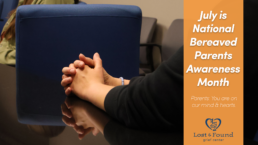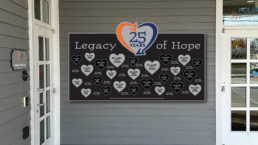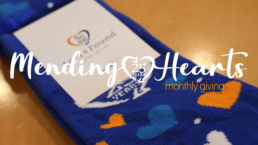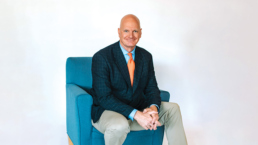Back-to-School Tips to Help Grieving Children
Back-to-School Trips to Help Grieving Children
The start of a new school year is a time for families to return to routines. After a summer of fun, camps, and a more relaxed pace, students and parents often look forward to the predictable cadence of school.
However, for children who experienced the loss of a parent, caregiver, or sibling the previous year, the start of school brings uncertainty and sadness as they navigate this annual milestone without an important person in their lives.
“It’s essential for teachers, administrators, fellow students, and their parents to understand how hard it is for a child following the loss of a loved one, ” said Melanie Blair, assistant executive director of Lost & Found Grief Center. “Communication is the key. We need to acknowledge the child’s loss and hold space for them during this difficult transition.”
Lost & Found Grief Center offers these tips for parents, caregivers, and teachers to help make that first semester back to school after a significant loss as smooth as possible.
Tips for parents and caregivers:
- Notify your child’s teachers. You want your child’s teacher to be aware of the death. Discuss with your child what they are comfortable sharing, so they feel included in the process. If the death occurred over the summer or a child is going to a new school, they may want to keep the death a secret. Parents should talk to their child about telling their story rather than having it come out in whispers.
- Speak with your child’s school counselor. After a death, children may exhibit changes in behavior: anger, trouble concentrating, isolation, and slipping grades. These changes can be part of normal grief and adjustment, but if they persist, they can be a sign that professional support is needed.
- Make a communication plan. You, your child’s teacher, and your child’s school counselor must communicate in a way that will work for all parties. If you have concerns at home, do not hesitate to update your child’s teacher and counselor so they can be aware and request that they do the same with you.
- Parents should take care of themselves. While self-care may be difficult following a tragic loss, research has shown that how grieving children fare is correlated to how their adult caregivers are doing.
Tips for teachers and counselors:
Teachers should know that even the most seemingly innocent activity can be overwhelming for a grieving student. Something as simple as an essay prompt that asks, “What did you do over the summer?” could inadvertently force a child to re-live the death of a family member.
- Be aware of potential grief prompts and provide additional support and understanding.
- Let students know their response is normal.
- Provide extra individual attention and support.
- Provide alternative assignments.
- Allow extra time for adjustment to new routines.
- Let the student know you understand things are different and challenging for them and invite them to talk to you about their struggles.
- Check in with these students more frequently to show support and encourage them to share their feelings.
- Establish a communication plan with parents and caregivers.
For more information about helping a student return to school following the death of a loved one, please contact Lost & Found Grief Center at (417) 865-9998.
Tips for Bereaved Parents Month in July
Every year in the United States, approximately 37,000 children die before reaching their eighteenth birthday. Deceased children of any age and their grieving parents are the focus of Bereaved Parents Month in July. Bereaved Parents Month aims to raise awareness about the grief parents experience following the death of a child.
“Parents are not supposed to outlive their children. It is not the natural cycle of life,” said Melanie Blair, assistant executive director at Lost & Found Grief Center. Blair is a bereaved mother herself, having lost her son Charlie to complications from bacterial meningitis in 2018.
“While the death of a child is devastating, at Lost & Found, we tell people, ‘The worst grief is your grief,’” Blair said. “So, whether you are grieving the loss of a young child, an adult child, a spouse, or a sibling, the steps to take care of yourself or what you can do to help someone you care about are similar.”
How to take care of yourself when you are grieving the loss of a child:
- Sleep, drink water, eat nutritious food, and exercise. You cannot feel better if your body does not feel good.
- Understand that grief is a natural response to the death of a loved one. While losing a child is not normal, grief is a natural reaction to the death of a child.
- Do not put a time limit on your grief. Grief lasts as long as it lasts.
- Seek professional help. Grief can be incredibly lonely and isolating—attending therapeutic grief groups or individual counseling like that offered at Lost & Found Grief Center can help ease the feelings of isolation.
How to support someone who has experienced the death of a child.
- Don’t just offer to help – find a way to help. Mow the lawn, care for pets, make a grocery run, or clean their house. You cannot take away their pain, but you can ease some of the burdens of everyday life.
- Avoid “at least” sayings, such as “At least they aren’t suffering anymore” or “At least they died peacefully.” Their child is dead, and the well-meaning attempts to make the parent feel better may only end up making them feel worse.
- Say their child’s name. A parent may fear that their deceased child will be forgotten, so speak their child’s name.
- Hold space for the grieving parent. You don’t have to say anything, but a caring presence can help ease someone’s grief.
- Do something to honor their child’s memory. A donation or act of kindness in their child's name will mean a great deal to a grieving parent.
It is also a good idea to encourage friends or family members who have lost a child of any age to seek professional grief support. Lost & Found Grief Center offers therapeutic grief support groups at no cost to the families it serves.
For more information on Lost & Found’s therapeutic grief support, visit lostandfoundozarks.com or call (417) 865-9998.
###
Contact: Mark Miller, Lost & Found Grief Center, Executive Director, (417) 839-2886, mmiller@lostandfoundozarks.com
Legacy Wall: Honoring 25 Years of Hope and Healing
In 2025, Lost & Found Grief Center celebrates 25 years of providing help, hope, and healing to grieving families throughout the Ozarks. Since our founding in 2000, we have walked alongside thousands of children, adults, and families during some of life’s most difficult moments.
To commemorate this milestone, we are proud to announce the upcoming installation of our Legacy of Hope Wall—a permanent exhibit that will debut in fall 2025. This custom-designed installation will be placed outside our main entrance. It features heart-shaped placards and spaces engraved with the names of individuals and organizations who are helping shape the next 25 years of our mission.
The Legacy Wall is currently in development, with early commitments from 11 generous donors totaling more than $120,000, including our presenting sponsor Mercy Health Systems. We are especially honored to include the 2025 class of Springfield Business Journal’s Men of the Year, who secured a heart in recognition of their collective support.
We are deeply grateful to Pinnacle Sign Group for their partnership in designing and installing this meaningful tribute.
We look forward to celebrating the partners who have made this possible when we install the 2025 Legacy of Hope Wall this fall.
If you or your organization would like to be a part of the 2025 Legacy of Hope Wall, please contact Jamie Fields, Director of Development, at (417) 865-9998 or email: jfields@lostandfoundozarks.com.
Together, we can ensure that no one grieves alone—now and for generations to come.
Lost & Found Selected as Charity Partner for SBJ Men of the Year
Lost & Found Grief Center is honored to be selected as this year's charity partner for the 15th annual Springfield Business Journal's Men of the Year class. This award recognizes the professional, philanthropic, and civic contributions of 20 businessmen throughout the Springfield region.
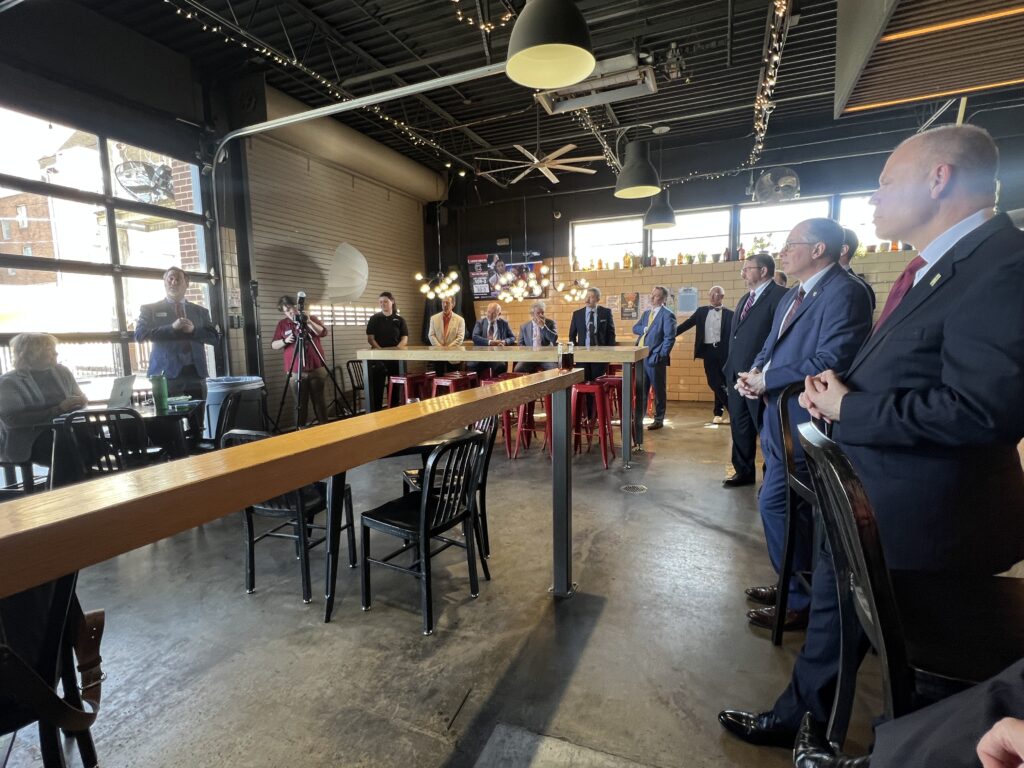
"The 2025 Men of the Year honorees, in alphabetical order, are: Mark Applegate, SeniorAge Area Agency on Aging; Dr. Kofi Asare-Bawuah, CoxHealth; Michael Cho, Craft Sushi and Hickory Hills Country Club; Cory Collins, Husch Blackwell LLP; Andy Drennen, Simmons Bank; Lonnie Funk, Rolling Oaks Group of Companies LLC; Stephen Hall, Springfield Public Schools; Colten Harris, City of Springfield; Douglas L. Healy, Healy Law Offices LLC; Brad S. Johnson, College of the Ozarks; Mark Kastner, retired; David Kelly, Nixa Public Schools; Samuel Knox, Unite of Southwest Missouri Inc.; Mark Milioni, Mission University; Dan Patterson, Greene County Prosecuting Attorney’s Office; Philip Rothschild, Missouri State University and Fresh Grounded Faith Events; Dr. Kenneth S. Sharlin, Sharlin Health and Neurology LLC; Joseph D. “Chip” Sheppard III, Carnahan Evans PC; Mark Walker, TransLand; and Kevin Waterland, Pitt Technology Group LLC."
To help celebrate Lost & Found Grief Center's 25th year as an organization, we challenged this group to raise a total of $25,000. Nominees can do this by creating a personalized fundraiser page or by sponsoring an upcoming event. Using a personalized fundraising page, each nominee can add a personal goal, photo, and additional info. Track the progress of each fundraiser, contribute, and see who the top fundraiser is today here. This challenge runs through April 24, when SBJ will host their Men of the Year event. Lost & Found Grief Center's Executive Director will also be a speaker at this event.
Congratulations again to all of this year's Men of the Year honorees.
If you are interested in creating a personalized fundraising page to support Lost & Found, reach out to info@lostandfoundozarks.com for details.
Read the original announcement from the Springfield Business Journal here.
Pictured: This year's honorees at the photo shoot on March 21, 2025.
Mending Hearts & 25th Anniversary Socks
At Lost & Found Grief Center, we are dedicated to healing hearts broken by the loss of a loved one.
Our Mending Hearts Monthly Giving program provides the steady support needed to offer our therapeutic grief groups free of charge to the families we serve.
As a token of our gratitude, every Mending Hearts donor who commits to a recurring gift of $25 or more will receive a limited-edition pair of Lost & Found Grief Center 25th Anniversary socks—a small but meaningful reminder of the comfort and connection your generosity makes possible.
Thank you for helping us mend hearts and bring help, hope, and healing to those navigating grief.
Lost & Found Grief Center Commemorates 25th Anniversary
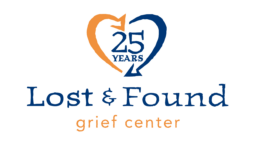
SPRINGFIELD, MO — The year 2000 marked a significant change for society as people looked forward to the dawn of the new century and millennium. That year was also an important milestone for grieving families and individuals in southwest Missouri. In 2000, Lost & Found Grief Center became the first organization in southwest Missouri to provide no-cost, professional therapeutic grief support to children and their families.
In 2025, Lost & Found Grief Center commemorates 25 years of providing help, hope, and healing to bereaved children, families, and adults through therapeutic grief support groups.
“We started Lost & Found because there is such a tremendous need,” said Dr. Karen Scott, co-founder and former executive director. “Most families who experience a death do not have the funds to pay for counseling. Lost & Found was a way to provide a much-needed service at no cost to families.”
Founded by Scott, a former school counselor, and local attorney Shawn Askinosie, Lost & Found held its first group sessions in Askinosie’s Springfield law offices. The need for grief therapy grew, and by 2006, Lost & Found moved to the Conor House, named after Conor Foster, who died at the age of 4. In the Conor House, Lost & Found expanded its offerings to include adults, not just children and their families. In 2015, Lost & Found continued to grow when it moved to its current location at 1555 South Glenstone Avenue.
Lost & Found started with a group for children and a group for their parents. Those first two groups had fewer than 20 people in total. Over a quarter-century, the number of people Lost & Found served through groups, individual counseling, grief education, and other services is well over 25,000.
Lost & Found provides bereaved people the opportunity to grieve in a supportive, understanding, and non-judgmental environment and is guided by the following principles:
- Grief is a natural reaction to death for adults, as well as children.
- Within each individual is the natural capacity to heal oneself.
- The duration and intensity of grief are unique for each person.
- Caring and acceptance assist in the healing process.
“Lost & Found employs a forward-moving model of grief,” said Melanie Blair, Lost & Found assistant executive director. “Rather than viewing grief as something to ‘get over,’ we approach grief as a process, where the goal is to move forward and live a meaningful life.”
In addition to no-cost therapeutic grief support groups, Lost & Found also offers fee-based individual counseling.
Contact: Mark Miller, Lost & Found Grief Center, Executive Director, (417) 839-2886, mmiller@lostandfoundozarks.com
###
About Lost & Found Grief Center: Founded in 2000, the Lost & Found Grief Center strives to improve lives in the community by providing help, hope, and healing through professional grief support services. The Lost & Found Grief Center works with those who are suffering to provide education and support as they face life without their deceased loved one.
Continuing My Journey
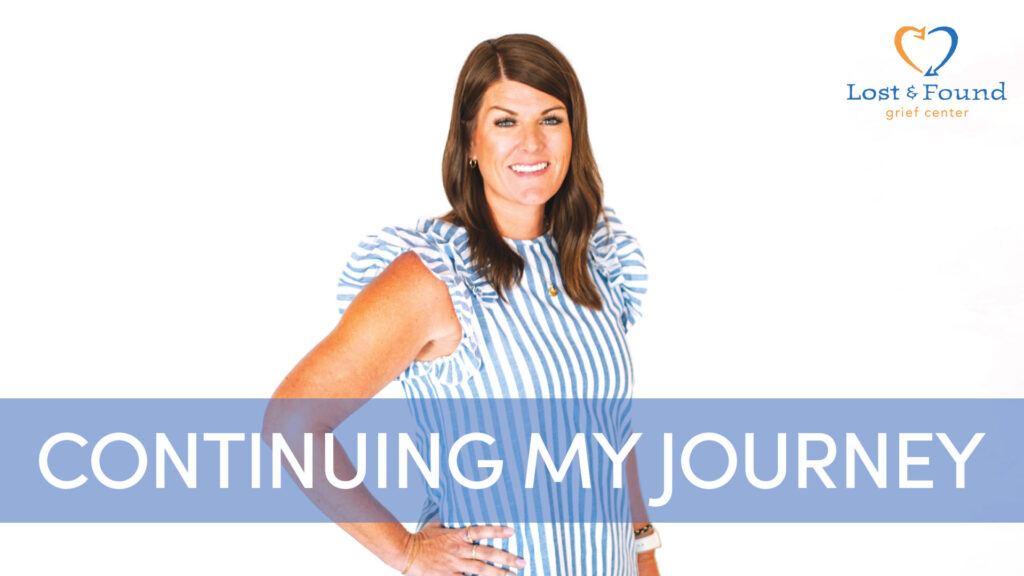
I am pleased to announce that I have recently accepted the promotion to Assistant Executive Director at Lost & Found Grief Center. Since July 2021, I have been employed at the center as a Program Coordinator. My experience at Lost & Found has been an exceptional opportunity for me to apply my personal meaning after the loss of our son, Charlie.
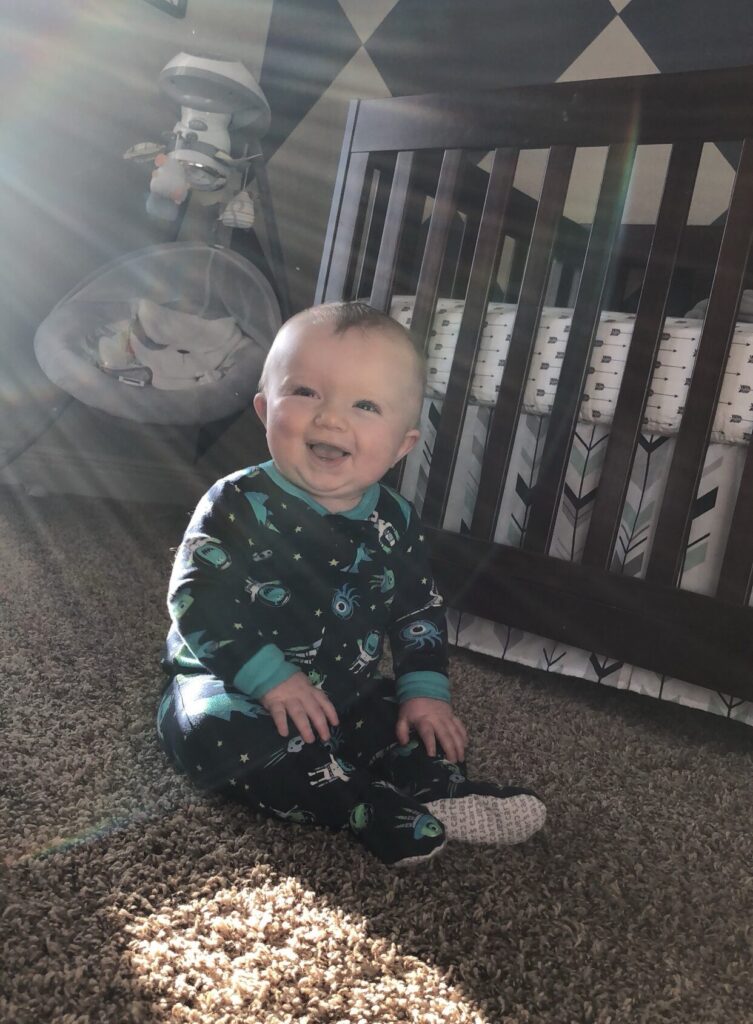
My husband and I received individual counseling with Dr. Karen Scott at Lost & Found in the months following the death of our son. Dr. Scott played an instrumental role in my journey and continued work here. She has been a beacon of support, providing me with guidance and helping me understand the grief journey that I was, and still am, on. Her unwavering belief in me has been invaluable, and I am grateful for her ongoing assistance.
Today, I have the privilege of supporting numerous individuals on their own journeys, and I see this role as a calling rather than a job. I take great pride in my work, and I am confident that I am meant to be here serving our families alongside so many talented and compassionate individuals.
I am excited to be a part of the next 25 years of service at Lost & Found and eager to take on the challenges and opportunities that lie ahead.
– Melanie Blair
Assistant Executive Director
Finding Meaning
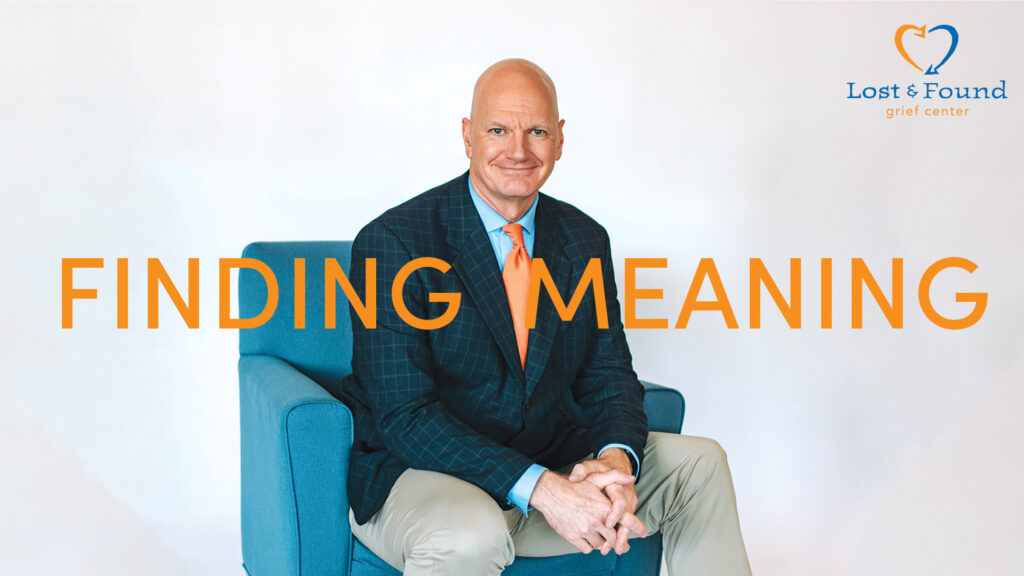
Hello, and thank you for allowing me to spend a few moments with you. My name is Mark Miller. I am the new Executive Director for Lost & Found Grief Center.
I am honored to join Lost & Found and its extraordinary staff of therapists and administrators in our mission to support those in our community who are hurting.
People grieve for many reasons — perhaps most profoundly for the loss of a loved one. I feel this daily, as my family and I lost our beloved son and brother, Luke, in 2019.
Luke, an accomplished college student and distance runner, was just 20 years old when he died due to complications from epilepsy.

Walking into our first therapy session at Lost & Found, my wife and I wondered how we would survive his loss. In the weeks and months that followed, thanks to Lost & Found, we found the solace we needed and wanted. Today, I can talk about Luke with a smile and try to live a life worthy of his memory.
I came to this role at Lost & Found following a decade of work in marketing and communications at Ozarks Technical Community College. At OTC, I participated in all aspects of the college's public relations and marketing strategy. In addition to my time at OTC, I worked in higher education communications at Drury University and the University of Colorado.
Before shifting into public relations, I had a 15-year television career as a news and sports anchor in Nebraska, Kentucky, and at local Springfield television station KOLR10.
I will use my communications experience to raise Lost & Found's profile so that more people may experience grief therapy's healing power. Ultimately, we will all suffer a loss, and grief will impact our lives.
The philosopher Friedrich Nietzsche said: "To live is to suffer. To survive is to find meaning in the suffering."
Taking on the Executive Director role at Lost & Found Grief Center is finding meaning in the suffering — an opportunity for which I am deeply grateful.
Best regards,
Mark Miller
Executive Director


